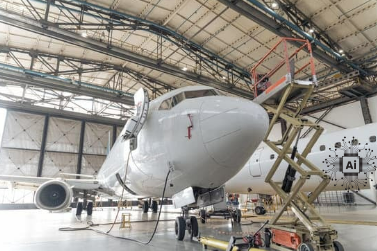How CIPA Can Renovate the Aerospace Industry
CIPA (Continuous Improvement and Performance Analysis) by Industry X.0 offers a cutting-edge digital transformation platform designed to enhance the Aerospace industry. By leveraging automation, AI, and advanced analytics, CIPA helps optimize operations, ensure regulatory compliance, enhance product quality, and foster innovation.
%
improved operational efficiency
%
error reduction in compliance
%
reduction in defect rates
Below are key areas where CIPA can deliver substantial value, along with specific use cases and the percentage improvements in performance and cost reduction :
Automated Compliance Documentation and Monitoring
Enhancing Regulatory Compliance
The Aerospace industry is subject to stringent regulations governing safety, quality, and operational procedures. Non-compliance can result in severe penalties and reputational damage. CIPA streamlines compliance management by automating documentation processes and continuous monitoring, significantly reducing the risk of regulatory breaches.
%
Error Reduction
%
Savings on compliance audit costs
Before CIPA
Manual tracking of compliance standards leads to a 10-15% error rate, resulting in potential penalties and operational disruptions.
After CIPA
Automating compliance processes reduces errors by 90%, leading to 50% fewer compliance-related issues and 40% lower audit costs.
Digitalized Production and Maintenance Operations
Boosting Efficiency through Digitalization
The complexity and precision required in Aerospace manufacturing demand efficient processes and effective resource management. CIPA enables digitalization of production and operational workflows, allowing for real-time data access, improved scheduling, and optimized resource utilization, thus enhancing overall efficiency.
%
improvement in operational efficiency
Before CIPA
Traditional methods result in 15-20% inefficiency in production schedules and maintenance, increasing costs and time delays.
After CIPA
Digitalizing operations improves efficiency by 30-40%, allowing for real-time adjustments based on data insights and operational demands.
Predictive Analytics for Maintenance and Quality Assurance
Advanced Analytics and AI for Continuous Improvement
In the Aerospace sector, utilizing data analytics and AI is essential for optimizing manufacturing processes and ensuring quality. CIPA employs advanced analytics to monitor production performance, predict maintenance needs, and analyze market trends, driving continuous improvement across various functions.
%
reduction in equipment downtime
%
savings in maintenance costs
Before CIPA
Unplanned maintenance can lead to 5-10% production loss, affecting delivery schedules and customer satisfaction.
After CIPA
Predictive maintenance analytics reduce downtime by 40-60%, optimizing resource allocation and improving equipment reliability.
End-to-End Traceability of Components
Improving Supply Chain Transparency
Supply chain transparency is critical in Aerospace to ensure the quality and safety of components and materials. CIPA enhances supply chain visibility by providing real-time tracking of parts and materials, enabling manufacturers to respond quickly to disruptions and manage risks effectively.
%
reduction in inventory costs
%
lower risk of counterfeit components
Before CIPA
Lack of visibility leads to 25% higher inventory holding costs and increased risks related to counterfeit parts.
After CIPA
Real-time tracking reduces inventory costs by 30%, ensuring authenticity and compliance throughout the supply chain.
Accelerating Aircraft Development with Data Insights
Fostering Innovation through R&D Optimization
In the highly competitive Aerospace industry, innovation is essential for maintaining a technological edge. CIPA streamlines research and development processes by facilitating data-driven insights and collaboration across teams, accelerating product development cycles and enhancing the ability to bring new technologies to market.
%
faster time to market for new aircraft models
Before CIPA
Inefficient data handling can extend aircraft development timelines by 15-25%, delaying market entry for new models..
After CIPA
Optimized data management and collaborative tools shorten time to market by 30-50%, enhancing competitiveness and responsiveness to market demands.
Continuous Quality Monitoring and Reporting
Ensuring Product Quality and Safety
Maintaining the highest quality and safety standards is paramount in Aerospace, where defects can lead to catastrophic failures. CIPA enhances quality assurance through continuous monitoring, automated reporting, and real-time data analytics, ensuring products meet the stringent safety and quality requirements.
%
reduction in defect rates
%
savings from reduced rework costs
Before CIPA
Manual quality checks can result in 5-8% defect rates, leading to increased rework costs and safety risks.
After CIPA
Real-time monitoring reduces defect rates by 50-70%, resulting in 30% fewer recalls and significant cost savings from reduced rework.
Reducing Energy Consumption and Waste in Production
Sustainability and Environmental Impact
Sustainability is becoming a critical focus in the Aerospace industry, driven by regulatory requirements and corporate social responsibility. CIPA aids organizations in optimizing resource usage and minimizing waste, aligning with sustainability initiatives while reducing costs.
%
reduction in energy consumption and operational costs
Before CIPA
Inefficient production processes can increase energy consumption and waste, resulting in 10-15% higher operational costs.
After CIPA
CIPA enables companies to reduce energy usage by 20-30%, significantly lowering costs and enhancing sustainability credentials.

